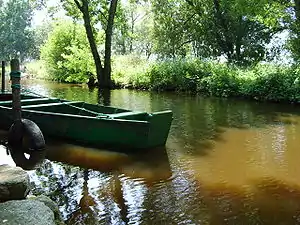Brière
Brière (Breton: Ar Briwer) is the marsh area to the north of the Loire estuary in France at its mouth on the Atlantic Ocean. The residents of Brière are called Brièrons. The Brière marsh area includes a vast area of humid zones stretching from the Gulf of Morbihan and the estuary of the Vilaine to the north, to the salt marshes of Guérande to the west to the estuary of the Loire River and the Lac de Grand-Lieu in the south. Peat used to be harvested here.

The Brière territory extends over 490 km2 (190 sq mi), including 170 km2 (66 sq mi) of humid zone, at the heart of which lies the Grande Brière Mottière which encompasses 70 km2 (27 sq mi) and 21 communes.
It is rich in flora and fauna, and navigation is possible with boats called chalands.
Cottages are a common sight in the area, with around 3000 thatched roof cottages dotted throughout the area.
Alphonse de Chateaubriant's prize-winning novel La Brière (translated as Passion and Peat), 1923, is set in the area and describes its traditions and culture.
Communes of Brière

The following communes are found in Brière
- La Chapelle-des-Marais
- Crossac
- Montoir-de-Bretagne
- Saint-André-des-Eaux, Loire-Atlantique
- Saint-Joachim (the commune covering most of la Grande Brière)
- Saint-Lyphard
- Saint-Malo-de-Guersac
- Saint-Nazaire
- Sainte-Reine-de-Bretagne
- Trignac
Traditionally, 21 communes are considered part of Brière (source : , pdf file) :
- La Baule-Escoublac
- Besné
- La Chapelle-des-Marais
- La Chapelle-Launay
- Crossac
- Donges
- Guérande
- Herbignac
- Missillac
- Montoir-de-Bretagne
- Prinquiau
- Pontchâteau
- Pornichet
- Saint-André-des-Eaux
- Saint-Joachim
- Saint-Lyphard
- Saint-Malo-de-Guersac
- Saint-Nazaire
- Sainte-Reine-de-Bretagne
- Trignac
- La Turballe
The Brière Regional Natural Park encompasses 17 communes (source: , pdf file)